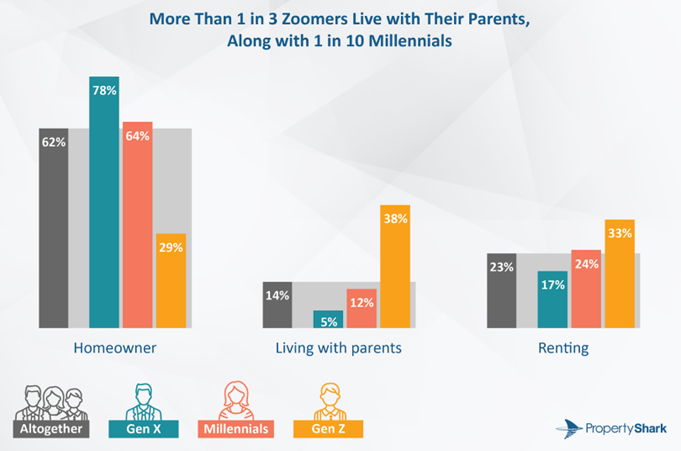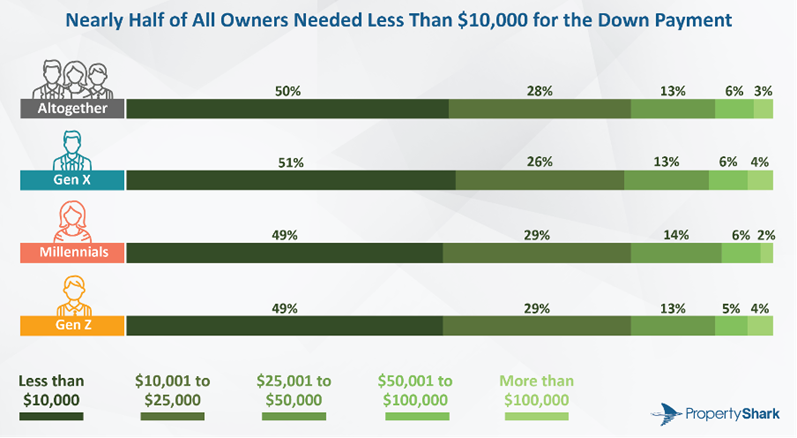
Key Takeaways
- Evolving Homeownership Attitudes: Gen Z is redefining the traditional American Dream of homeownership, viewing it less as a marker of success and stability due to economic barriers and limited availability.
- Preference for Flexibility: This generation values flexibility and mobility, prioritizing the ability to move freely and work globally over the permanence of owning a home.
- Technology Integration in Lifestyle Choices: Gen Z’s technological proficiency drives their preference for digital solutions in housing, favoring platforms that simplify renting and property management over traditional homeownership processes. .
- Shift in Real Estate Dynamics: The real estate market is adjusting to these changes by increasing offerings that match Gen Z’s preferences for flexible leases and technologically integrated living spaces, reflecting a shift towards valuing experiences and adaptability in housing.

It’s time to face the music—or perhaps, the real estate listings: The American Dream, at least as it pertains to homeownership, is undergoing a significant transformation, and Gen Z is leading the charge. The Baby Boomer generation witnessed the relentless pursuit of homeownership, driven by the belief that owning a piece of this great nation is a hallmark of success and stability. But as the winds of change blow, the younger generation—those digital natives are rewriting the rules in their own code.
Let’s dive into the heart of the matter: Gen Z is not buying into the idea of homeownership like generations before them. Sure, some early data points suggested a promising uptake among these young savants, with statistics from Redfin indicating that a slightly higher percentage of 25-year-olds owned homes in 2022 compared to Millennials and Gen Xers at the same age. But let’s not be too hasty in drawing conclusions. The economic landscape that facilitated the previous generation’s entry into homeownership has eroded under the weight of skyrocketing mortgage rates and a critical shortage of housing inventory. For many in Gen Z, the financial burden of a traditional 30-year mortgage simply doesn’t square with their broader economic realities or their lifestyle aspirations.

Financial constraints are but one side of the coin: Gen Z’s preference for flexibility and mobility plays an equally crucial role in their housing choices. Unlike their parents or grandparents, many of whom sought a stationary life anchored by physical assets, today’s youth thrive on fluidity. They are global citizens, fueled by a digital economy that allows them to work, play, and live without geographic constraints. Why chain themselves to a fixed address when the world offers a richer canvas for their ambitions?
The technological savviness of Gen Z cannot be overstated: This is a generation that grew up with smartphones in hand and the world at their fingertips. The idea of slogging through piles of paperwork and dealing with the archaic processes associated with traditional homeownership is antithetical to their streamlined, digital-first approach to life. Platforms that allow one to rent with ease, pay online, and communicate electronically with landlords are more in line with their modus operandi.
Let’s talk about the self-avowed “forever renters.”: An intriguing moniker, isn’t it? It suggests a deep-seated recognition among many in Gen Z that the freedom to move and adapt is more valuable than the perceived security of home equity. It’s a pragmatic adaptation to an uncertain world, where economic, environmental, and geopolitical stability can no longer be taken for granted.

Looking ahead, the implications for the real estate market are profound: We’re likely to see a surge in demand for flexible leasing options, smarter living spaces, and housing that integrates seamlessly with technology. The real estate industry must pivot to address these needs, offering solutions that resonate with a generation that values experience over possession.
In conclusion: as I ponder the shifts in generational attitudes toward homeownership, I am reminded that change is the only constant. Gen Z’s preference for renting is not just a financial decision but a lifestyle choice that speaks to their broader values and the unique challenges they face in our rapidly changing world. As they chart their own paths, perhaps it’s time for the rest of us to reconsider what the American Dream means in the 21st century.










